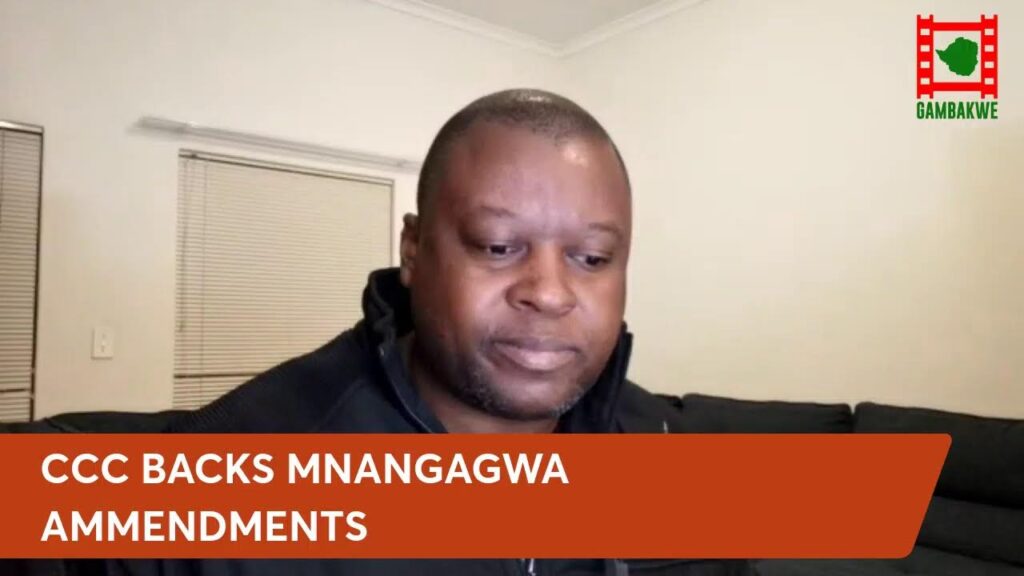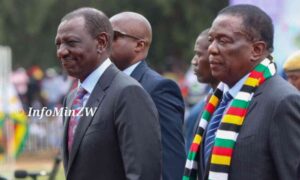WATCH LIVE: CCC betrays Chamisa, backs Mnangagwa ammendments


[embedded content]
WATCH LIVE as Gambakwe looks at the proposed amendments to the Zimbabwe constitution that will allow Mnangagwa to extend his current presidential term to 2030.
Please watch the video above this post for more details:
Topics:
1. Amos Chibaya speaks on constitutional amendments.
2. Ziyambi Ziyambi says the amendment was proposed by Hwende and Markham.
3. 69 detained immigrants escaped from Lindela detention centre including 5 Zimbabweans, 39 from Tanzania, 14 from Malawi
4. Proposed Amendments will result in voter registration being given back to the Registrar general and will be automatic for first time voters.
5. An independent delimitation board will be set up.
6. ZANU-PF likely to sneak in other amendments under the guise of this amendment.
7. Job Sikhala re-appears in South Africa,
8. General Chiwenga at St Marys Basiclica in Bulawayo yesterday
9. Helliate Rushwaya ZBC board chair appears on ZBC after various scandals
10. Mike Kamungeremu awarded with African Business leaders of the year award.
11. Mike Kamungeremu is the President of the Zimbabwe National Chamber of Commerce and Managing Director of Tendo Electronics.
12. Khama Billiat scores his first goal in Zimbabwe against Bikita minerals.
13. Pomona City stands for sale with 5 year plans by Wesprop.
14. Suspicions raised on Markus Jooste ‘s death as his body has not been seen. South African Police refusing to confirm his cause of death – The Star Newspaper.
The Zimbabwe Constitution lays out the fundamental structure of the government, and presidential term limits are a key aspect of that structure.
The Fourth Schedule typically focuses on the qualifications of voters.
The direct term length for Parliament isn’t explicitly stated in the Zimbabwean Constitution. However, two sections are relevant to this concept:
Section 143: Duration and dissolution of Parliament [1]. This section deals with the circumstances under which Parliament can be dissolved, effectively ending its term.
Section 144: General election resulting from dissolution of Parliament [1]. This section follows the dissolution mentioned in Section 143 and focuses on the resulting general election.
While these sections don’t provide a set term length, they establish the framework for how long Parliament can function between elections.
In Zimbabwe, Parliament can be dissolved under specific circumstances outlined in the country’s constitution. According to the Constitution of Zimbabwe adopted in 2013, Parliament can be dissolved in the following circumstances:
Expiration of the Parliamentary term: The term of Parliament is five years from the date of the first sitting after a general election. At the end of this term, Parliament is automatically dissolved unless dissolved earlier under other circumstances.
Dissolution by the President: The President of Zimbabwe has the authority to dissolve Parliament if certain conditions are met. According to Section 143 of the Constitution, the President can dissolve Parliament if the President has dissolved Parliament under Section 58(1) (b) or (c). These sections allow for the dissolution of Parliament if it fails to approve a bill that the President has referred to it for reconsideration or if Parliament refuses to pass a bill which the President considers urgent.
Dissolution following a successful vote of no confidence: If a motion of no confidence in the government is passed, and the President does not resign within a prescribed period, Parliament may be dissolved. This is outlined in Section 109 of the Constitution.
Other circumstances: Extraordinary circumstances such as a state of emergency declared by the President could potentially lead to the dissolution of Parliament, although this would likely be an exceptional measure.
The procedure for amending the fourth schedule of the Zimbabwean constitution without a referendum depends on the specific nature of the proposed amendment and the requirements outlined in the constitution itself.
In general, the Zimbabwean constitution provides for two main methods of amendment:
Amendment by Parliament: Under certain circumstances, amendments to the constitution can be proposed and passed by a two-thirds majority vote in both the National Assembly and the Senate (the two houses of Parliament). These amendments typically don’t require a referendum unless specifically stated in the constitution.
Referendum: Some amendments may require approval through a referendum. This is usually the case for amendments that are considered fundamental or significant, such as changes to certain entrenched provisions of the constitution.
Chapter 4 and Chapter 16: The requirement for a referendum becomes stricter for amendments to Chapter 4 (which includes the fourth schedule) and Chapter 16 (dealing with land). In these cases, the amendment needs to not only be passed by Parliament but also be approved by a majority of voters in a national referendum.
Amendments to Fourth Schedule
Chapter 4: This is a major section within the constitution itself. It outlines fundamental rights and freedoms guaranteed to Zimbabwean citizens. Examples include the right to life, freedom of expression, and protection from discrimination.
Fourth Schedule: This is a separate document attached to the constitution. It provides specific details on how certain procedures are carried out, often related to specific chapters. In the case of Zimbabwe, the fourth schedule focuses on presidential elections, laying out processes like nomination requirements and timelines for voting.
Amendments to Chapter 4 and Chapter 16 usually entail more stringent requirements, including approval by a national referendum, whereas amendments to the Fourth Schedule would follow the standard amendment process unless otherwise specified.






